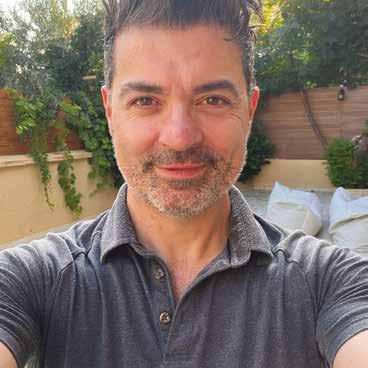WAR CRY



An unknown woman steps in to help a family in film based on t rue stor y

Rod goes from rock bottom to real peace

The Salvation Army is a Christian church and registered charity seeking to share the good news of Jesus and nurture committed followers of him. We also serve people without discrimination, care for creation and seek justice and reconciliation. We offer practical support and services in more than 700 centres throughout the UK. Go to salvationarmy.org.uk/find-a-church to find your nearest centre.
The Salvation Army first published a newspaper called the War Cry in London in December 1879, and we have continued to appear every week since then. Our name refers to our battle for people’s hearts and souls as we promote the positive impact of the Christian faith and The Salvation Army’s fight for greater social justice.


Your local Salvation Army centre
REVIEWING one graphically violent film 20 years ago, critic Mark Kermode described himself as ‘a hardcore horror fan who is also an habitual churchgoer’. This week, the War Cry carries an interview with a Baptist minister who is similarly fascinated with horror stories.
Peter Laws not only talks of enjoying horror films, but also hosts podcasts which explore spooky themes (though the interview does not cover what, if anything, he thinks about the ‘blood-splattered’ film that Mark Kermode was reviewing back in 2004 – Mel Gibson’s The Passion of the Christ).
Peter understands why many people, including Christians, do not share his enthusiasm for horror. ‘I’d never encourage someone to watch something brutal, with the claim that it’s a rich source of spiritual reflection,’ he says. ‘But, for me, to be scared in a horror film is a safe scare.’ He adds: ‘To say that life has no darkness in it would be completely untrue.’
Whatever our cinematic taste, it’s clear that there is plenty of darkness in the world, including the horrors of war and social problems such as racism and poverty. Individuals also often find themselves engaged in what is commonly described as ‘battling their demons’ – perhaps a struggle with anger, drink or, in the case of Rod Williams, who tells his story in this issue, drugs.
The title of another film covered this week, however, hints at another aspect of reality. New release Ordinary Angels echoes the colloquial meaning of what it means to ‘be an angel’.
And a close look at the pages of this issue of the War Cry will reveal many people who are inspired by their Christian faith to show such kindness – including those behind the rehab centre which helped Rod Williams overcome his drug addiction; the Salvation Army workers combating modern slavery; and the members of a church in Honduras who are reducing plastic pollution.
Tackling darkness head-on, they show the world that it can be a more wonderful life.






Hilary Swank plays a woman who sets aside her own problems to help a family in need
EDWARD SCHMITT is struggling.
Having lost his wife five years ago, he is back in the hospital – this time for his five-year-old daughter. Her life is at risk, because he can’t pay for her treatment. The family need a miracle. In Ordinary Angels, released in cinemas on Friday (26 April), that miracle comes in an unexpected package.
The drama – based on a true story –shows Ed (Alan Ritchson) finding life difficult after the death of his wife. He has stopped attending church and, while trying to make ends meet as a casual roofer, he is also caring for his sick daughter, Michelle (Emily Mitchell), and her sister, Ashley (Skywalker Hughes), and shouldering his grief.
Elsewhere in Louisville, hairdresser Sharon Stevens (Hilary Swank) seems to be having a good time. But her friend is concerned with how much Sharon is drinking. After being ambushed and dropped off at an Alcoholics Anonymous meeting, Sharon is inspired by the life advice of one of its members: ‘Find a reason to be here that’s bigger than you are.’

Sharon helps Ed sort through his bills
medical bills. After inviting herself into the family’s life, she finds out that Ed is in more trouble than she first thought – with hundreds and thousands of dollars of medical debt.
As well as helping him to confront his financial problems, Sharon brings some fun and sparkle back into the girls’ world with her larger-than-life personality. When she reaches out to corporations, companies and the local news station with Ed’s story, the community respond and the family receive more help than they could have asked for.
Ed feels resentful
On her way home, she spots a local newspaper story about Ed’s daughter Michelle, who has a genetic condition and needs a liver transplant. The plight of Ed’s family becomes Sharon’s ‘reason’. She takes it upon herself to raise money in the city to help with Michelle’s
But Ed is still angry. He feels resentful that he has to rely on charity and can’t provide for his family. He feels angry that the prayers for his wife and now his younger daughter seemed to go unanswered.
One day his daughter Ashley asks him: ‘You mad at God, Dad? Is that why we don’t pray any more?’ He’s silent. She continues: ‘It’s OK, everybody gets mad
sometimes, but we should still talk to him.’
Any of us might feel angry if we were to face a similar situation – or any tough times. But Christians have found that it is OK to be angry with God. And that, as Ashley says, even when we are, it is still a good idea to talk to him.
A man named David, whose story is told in the Bible, experienced a far-fromperfect life and felt angry with God on many occasions. ‘How long must I struggle with anguish in my soul, with sorrow in my heart every day?’ he asked God. ‘Turn and answer me, O Lord my God!’
However, having acknowledged his pain, he said: ‘But I trust in your unfailing love. I will rejoice because you have rescued me (Psalm 13:2, 3 and 5 New Living Translation).
By speaking truthfully to God, David experienced the miracle of his comfort. In our most difficult moments too, God can give us hope and help way beyond the ordinary – we just need to reach out to him.
‘MATTEL,’ says journalist Rebecca Reid, ‘has done something unforgivable. They’ve messed with Scrabble.’
Variation can be enlightening
To give the word game a shake-up, bosses at Mattel have created a new version which, explained Rebecca in the i newspaper, is ‘intended to be more collaborative and less competitive’. Instead of single players choosing and placing their words carefully on the board to score the highest points, the new Scrabble Together game requires a team to work with each other to complete word challenges. Helper cards are also on hand to provide prompts and clues. While Rebecca refers to Scrabble’s latest move as ‘a mistake’, the global head of games at Mattel, Ray Adler, argues that it ensures the game is ‘inclusive for all players’. An article on the Guardian website quoted him as saying: ‘For anyone who’s ever thought “word games aren’t for me”, or felt a little intimidated by the classic game, Scrabble Together mode is an ideal option.’
Although I’m a traditionalist when it comes to Scrabble – who doesn’t love a triple word score? – I welcome the news that Mattel is trying to make the game more appealing to everyone. People who wouldn’t normally touch word games with a bargepole are being invited to start. Who knows? Scrabble Together might even encourage new players to try the original game. Providing variation to what’s already on offer can be enlightening.
That’s how I feel about the Bible. Over the years, it has been translated multiple times – that is, it has been rephrased so that people all over the world can access and understand its message of God’s love for them.
If I feel too intimidated by the King James Bible, published in 1611, I know that I can turn to something such as the Contemporary English Version, which uses modern everyday speech. Both texts have value. Both styles have a different appeal. But both books carry the same stories which inspire me.
For anyone who has ever thought ‘the Bible’s not for me’, it is. However it’s packaged, its words are for all.
RYAN PHILLIPPE told US TV channel Fox News that playing the role of a Christian missionary who has a crisis of faith sent him on a ‘spiritual journey’.
The American actor revealed that he was in a ‘darker place’ when shooting his new action thriller Prey, which prompted him to explore matters of faith and God.
‘I got back into reading the Bible and various other religious tomes, but I found myself drawn to this notion of spirituality,’ he said. ‘You get to a point in life, a certain age, and the things that you thought would bring you pleasure or make you feel satisfied – vis-à-vis success or money – don’t.’
Ryan went on to explain that he started looking ‘for more’, and realised that he wanted to find ‘a relationship and understanding with God’. He said that since he started his ‘journey’, he has found more peace.


A CHRISTIAN aid and development charity was heading to the latest round of UN talks on a global plastics treaty with the aim of highlighting a church project in Honduras.
Tearfund – which can attend sessions at the negotiations in Ottawa, as well as taking part in side events and meeting delegates – has been working with Pastor Wilfredo Vásquez, who leads the Church of God in El Rincón, to tackle pollution.
Reflecting on his church’s project, Wilfredo says: ‘There was waste everywhere in our community. A lot of the rubbish was being burnt. Items included plastics, clothes and nappies. Before, there was never any garbage collection. Therefore, our community was very dirty.
‘As a church we have worked on cleaning up the community and have run awareness campaigns about the use of plastics and the burning of garbage in the community.’
Alongside Tearfund, Wilfredo has been working with community leaders and local government. Now a rubbish truck goes through the town once a week, a youth group from the church collects and recycles plastic, and other recyclable waste is collected at various points.
Members of the community have reported that their health has improved since they stopped burning their waste.
Since the UN talks began in 2022, Tearfund has been campaigning on behalf of people in poverty who are affected by plastic pollution.
Tearfund’s Miriam Moreno, who works with the church in El Rincón, says that a global treaty is necessary to ensure there is ‘far more action from governments and companies’ in reducing, recycling and safely disposing of waste.
TELEVISION personalities have teamed up with the Archbishop of Canterbury to record readings of Bible stories for an illustrated children’s video series, The Cheeky Pandas and The Jesus Storybook Bible
In the six-part series, which is free to view on YouTube, Mary Berry, Bear Grylls, Gemma Hunt, Joanna Adeyinka-Burford and the Most Rev Justin Welby narrate stories from The Jesus Storybook Bible by Sally LloydJones. Each video is introduced by characters from Cheeky Pandas, an animated series for children.
The production company behind the series has created British Sign Language episodes and some widget packs – which break down the episodes into symbols rather than text – for neurodivergent children.
CBeebies presenter Gemma Hunt said she hoped that the new videos of the Bible stories would ‘inspire


THE Salvation Army and the University of Hull have announced a new partnership to improve immediate and long-term support for survivors of modern slavery.
Together the church and charity and the University of Hull’s Wilberforce Institute for the study of slavery and emancipation will work on, among other activities, a shared PhD research project examining the reintegration of people who have experienced modern slavery and human trafficking back into communities.
Commenting on the importance of partnerships, Major Kathy Betteridge, director of anti-trafficking and modern slavery for The Salvation Army, said: ‘It is only by working together that we can have a significant and lasting impact on this evil trade.’

ROD WILLIAMS had a happy upbringing, but in his late teens he began to make choices that were ultimately destructive. After reaching his lowest point, he ended up in prison. There, he found the peace that he had been searching for all along
Interview by Sarah Olowofoyeku


‘IWAS sleeping on the floor of a crack den in London when I realised I’d hit rock bottom,’ says Rod Williams, who had been taking and dealing drugs for years. ‘It was dark, and I was surrounded by other addicts. I was the first one to wake up one morning, lying on the floor, after a night of heavy heroin and crack cocaine use. I stood up and saw all these bodies on the floor, drug paraphernalia everywhere, spillages of blood where people had missed the veins, and it was an awful sight.
‘I’d been in those surroundings before, but the reality hit me that day. I started to cry, and there was a cry from my heart to say: “I really want out now. I hate the person I’ve become and the decisions I’ve made that have taken me to this place.” That was my rock bottom, but it was the beginning of my journey to freedom.’
Twenty years earlier, it may have been hard to believe that Rod would end up in such a position. He had a happy childhood, growing up in a friendly culde-sac in south Wales with his older sister and his mum, and attending church with them every Sunday. Though his parents’ marriage had broken down, it had been an amicable split, and Rod still saw his dad regularly.
But, he says, addiction can happen to anyone. Several years after moving to Guernsey when his mum remarried, Rod’s life changed.
‘In my late teens, I drifted away from my church friends and started to hang out with a new group,’ he says. ‘They were out partying at weekends, getting smashed off their faces and experimenting with drugs. That’s when I started to dabble with cannabis. I knew the decisions I was making were contrary to the values I’d been taught, but I just saw it as a bit of harmless fun.’
Before long, that harmless bit of fun turned into a destructive lifestyle.
‘I got a good job in the finance industry, earning good money, which then led me into the club scene. By the age of 18, I was taking and dealing Ecstasy. Within a few months of me using it, I started to embrace this world that promised me everything – power, pleasure, popularity.




I would walk into pubs and clubs, and people would flock to me, because I had something that would supposedly make their weekend better.
‘As the weeks and months went on, I took more drugs. I got involved with smuggling drugs on to the island, which made me a lot of money. But around that time I was gambling as well, so I was losing a lot of money too. I lost over £100,000 between the ages of 18 and 24.
I became unrecognisable to my parents
five or six years living a crazy lifestyle, replacing one drug with another, always trying to beat the system and the bookies to get more and more money. But all it ever did was get me into more debt, more addiction.
‘Then I started to take heroin. If someone had offered me heroin five years previously, I would have said: “No way.”
But that’s the journey addiction takes you on. I didn’t think I’d get addicted, but with heroin you are almost instantly.’
‘I became unrecognisable to my parents. Police and customs officers were often raiding the family home. I spent
Deep in addiction, and in a vicious cycle of trying to pay off debts and getting
Turn to page 8 f

From page 7
into more debt, Rod was surprised one day when his concerned dad made an unannounced visit to Guernsey.
‘He walked into my house, which was filthy,’ recalls Rod. ‘He saw my teeth, brown-stained from heroin usage. He sat down in the lounge and shared his concerns with me. He offered me help. He said that if I didn’t take up his offer, there were three outs: “You’ll either end up in prison, in hospital or in the grave.” Within 12 months, I ended up first in hospital, then in prison.’
Behind bars – about a month after his rock-bottom moment in the London squat –Rod’s life was to change again, this time for good.
‘Being in prison gave me a lot of time to think about the person I’d become, the people I’d hurt and my future. My mum told me that I couldn’t change my past, but my future could be different if I gave God the opportunity to show himself to me, because he was the only one that could change my life.
‘I thought about what she said, and I read the books my parents had sent, such as The Cross and the Switchblade and Run Baby Run. I read about gang members and prostitutes, people whose lives were ravaged by extreme addiction, but who had an encounter with Jesus. They spoke about having a new-found peace, which is what I had been searching for. I thought the money, the relationships and the power would give it to me, but they never did.

up, I knew something had changed. There was the peace that I’d been praying for. I felt an explosion of love fill my heart, and I knew things would be different, that I had a future.’
One night I decided to see if Jesus was real
‘One night I decided to see if Jesus was real. I got down on my knees in my cell and started to pray. I cried out to God, asking, “If you’re real, will you show yourself to me?” I said sorry and asked for forgiveness. I prayed that I’d have the peace and joy I’d been reading about.
‘I don’t know how long I was on my knees – maybe an hour – but when I got
Over the next weeks, Rod read about Jesus in the Bible. He spoke to his family about his experience, and prayed. Although the early days of his walk with God were not easy, he eventually went to a Christian rehabilitation centre, where, over 16 months, he became free of his drug addictions, developed his faith and began to rebuild his life.
After completing its programme, he worked at the rehab centre for four years, helping other addicts. He then spent 13 years with the charity Christians Against Poverty, assisting people to become debt-free.
In 2014, 10 years after he cried out to God in prison, Rod wrote a book about his life, The Real Deal. This year an updated
edition has been published, reflecting his more recent experiences.
‘I wrote it to show that the adventure with God never stops,’ he says. ‘My wife and I have adopted a child. I go into prisons and speak. I’m a professional illusionist, and I visit churches to put on a magic show and tell my story. God is using my skills as an illusionist so that people can connect with the message of hope.
‘God continues to do the impossible through the ups and downs of life. Being a Christian is not a bed of roses, but God still does miracles and has continued to do his work in me.’
 Rod is an illusionist
Rod is an illusionist
’


LAWS describes how a fascination with horror stori es led him to a deeper relationship with GodInterview by Claire Brine
AUTHOR and podcaster Peter Laws says that he has always been drawn to spooky, gothic and horror stories. When he became a Christian at university, he assumed initially that his fascination with scary subjects had to stop – because ‘Christians shouldn’t like things like that’. But his interest in the macabre was hard to put down.
After undertaking a master’s degree in preaching, in which he studied the potential of using horror to preach a gospel message, Peter found that his love of spookiness

didn’t have to exclude him from pursuing a relationship with God. In fact, he says that exploring darker realms has led him to experience a deeper level of faith.
‘I find myself attracted to the things that a lot of other people tend to look away from,’ says the Baptist minister and host of the YouTube show and podcast Frightful ‘with Rev Peter Laws’.
‘When people feel that Christians shouldn’t enjoy horror films or books, the rebel in me asks why not. The weird and the supernatural make the colours of life shine brighter for me. They show us that life can be more cosmic than we might first think.
In Tunisia, ‘The Exorcist’ was banned as Christian propaganda
‘I’m hooked by anything which provides potential evidence for a supernatural world because, if you can open the door to the supernatural, you’re opening the door to God himself.’
In 2020, as the UK lived through lockdowns, Peter created a spooky yet spiritual podcast, which carried the tagline ‘Songs of Praise meets Stephen King’. Set in a fictional fishing village, Creepy Cove Community Church was aimed at listeners who, united in their love of scary stuff, were seeking community during a time of national isolation.
‘Each episode was a church service, but one in which horror movies happened,’ explains Peter. ‘So the podcast
Turn to page 10 f
From page 9
included church notices, real hymns which sounded a bit spooky, eerie prayers and a sermon. I also included immersive sound effects, so you could hear the congregation laughing or coughing.
‘Looking back, the concept was totally absurd: a podcast of a church service with characters such as Dracula in the pews, or Jack Torrance from Stephen King’s The Shining being present at the Nativity. But the people listening seemed to like it. Sometimes I’d get messages from atheists, saying: “I don’t believe in God, but I’m proud to go to Creepy Cove Community Church.”’
As well as reaching the devout unbelievers, Peter’s podcast appealed to Christians. Many of them, he points out, share his enjoyment of horror films.
‘Once I was chatting to a woman in her 90s and she told me that she was a big fan of the film Evil Dead 2, because she found it funny. There’s a surprising number of Christians who like to watch scary stuff. And it was horror films that got me on the track of going to church in the first place.
‘I think the reason people are drawn to horror is the same reason why people are drawn to spirituality. They’re considering the questions, “Could there be something more than just what I see around me? Is there anyone out there?” When I was at school, I remember thinking about those questions a lot.’
As a teenager, Peter met some Christians who offered him a ‘doorway to the spiritual world’. However, they said that he would need to stop watching horror films if he wanted to take faith seriously.
‘I supposed, then, that Christianity wasn’t for me,’ Peter says. ‘The God I was presented with didn’t seem to like me or my personality. It seemed that my interests were not allowed.
‘Then, when I went to uni, a few things happened that made me think more deeply about spirituality. A couple of my friends died, which made me consider my own mortality. And I also fancied this girl who I met in a nightclub, but she said she wouldn’t go out with me, as I wasn’t a Christian.
‘Because I was feeling reflective about death, and because I wanted to get this girl’s attention, I decided to go to the
Christian Union. The Christians I met made a big difference in my life, and I became a Christian myself.’
Committed to his new-found faith, Peter tried his best to suppress his interest in the macabre. But horror stories continued to fascinate him. He felt that they gave his faith a fresh perspective.
To be scared in a film is a safe scare
‘Today, I feel that horror is the only film genre to take the supernatural seriously,’ he explains. ‘There’s not a lot out there which pushes this “good versus evil” battle in terms of the spiritual realm.
‘The Exorcist is a great example. It
was banned in many places in the UK, and Christians were outraged at how “blasphemous” it was. Yet in Tunisia, the film was banned on the basis of it being Christian propaganda, because its overriding message is that the Devil exists and the clergy – with their mustard seed of faith – can overcome his powers. I’ve never seen a film that shows church leaders in such a positive and influential light.
‘If someone isn’t a fan of horror, I’m not about to say that they should watch it. I’d never encourage someone to watch something brutal, with the claim that it’s a rich source of spiritual reflection. But, for


me, to be scared in a horror film is a safe scare. I’m in control, so I know that I am secure.’
Being scared is a subject that Peter explored in greater depth in his book The Frighteners: Why We Love Monsters, Ghosts, Death and Gore
‘One of the questions I ask through the book is why people want or like to be scared,’ he says. ‘The answer is much more complex than “because you just get a kick out of it”. Often, people are drawn to scary things because they are seeking out safe ways to learn courage.’
Not all Christians may agree with his view. After all, they may argue, doesn’t the Bible say that followers of Jesus should


think only on things that are pure, right, true and lovely?
‘Yes – but if we are to contemplate what is true, then surely we must incorporate thoughts on both light and darkness,’ says Peter. ‘To say that life has no darkness in it would be completely untrue.’
Peter also believes that acknowledging the darkness in the world helps us to see the light around us more clearly.
‘A beautiful image for many people is the night sky,’ he says. ‘If it was in total darkness, we wouldn’t be able to see anything. Yet if there was total light, it would be blinding and nothing would stand out. It’s the combination of light and darkness which is striking – and that’s the reality of life. It’s a bundle of the fascinating, frightening and beautiful.’
While Peter’s interest in the supernatural led him to Christianity, he admits that permission to doubt remains a significant part of his faith. He continues to search for evidence that God exists. But the nature of God is a subject on which he feels much clearer.
‘My doubts are never about whether God loves me,’ he says. ‘I believe he does. For me, God is best expressed through the character of Jesus. He’s exciting and appealing. I find Jesus attractive because he sees the beauty in the things which everyone else tends to hate. His reactions to people and situations are the reactions that I aspire to have in my own life.’
THE War Cry invites readers to send in requests for prayer, including the first names of individuals and details of their circumstances, for publication. Send your Prayerlink requests to warcry@salvationarmy.org.uk or to War Cry, 1 Champion Park, London SE5 8FJ. Mark your correspondence ‘Confidential’.
jThere is no set formula to becoming a Christian, but many people have found saying this prayer to be a helpful first step to a relationship with God Becoming a Christian
Lord Jesus Christ, I am truly sorry for the things I have done wrong in my life. Please forgive me. I now turn from everything that I know is wrong.
Thank you that you died on the cross for me so that I could be forgiven and set free.
Thank you that you offer me forgiveness and the gift of your Holy Spirit.
Please come into my life by your Holy Spirit to be with me for ever.
Thank you, Lord Jesus. Amen

WHEN was the last time you had a few minutes to spare? In a culture that never stops moving, some people find that spare time and moments of stillness are few and far between. Perhaps as a result, in recent years there has been a rise in meditation and mindfulness.
But centuries before their current popularity, the Bible encouraged people to meditate. Psalm 1 talks about the benefits of meditating on God’s word day and night. Jesus often withdrew to quiet places to pray.
Recently I was due to make a long journey and had to attend a medical appointment on the way. Having prepared for the trip, and it being too early to set out, I found myself with some of those precious quiet moments to spare. Having practised silence and stillness for a few years, I felt no need to fill the joyful peace by picking up my phone or getting distracted by chores. I was just still.
Eventually, I headed to my appointment, feeling prepared for the day ahead – and then came a moment of serendipity. At the exact time I was going through the door for my appointment, I was able to alert medical professionals of the need to give urgent attention to a man who collapsed and had a heart attack as I walked past.

Those moments of stillness and peace earlier in the day had created space for God to guide my steps so that a man’s life was saved. It felt like a holy moment.
When the culture of the day pulls our attention to everything, everywhere all at once, might we be missing opportunities to connect with God and be directed by him? In an age when our attention is constantly being competed for, what are we being distracted from?
Perhaps if we make time during our busy days to connect with God, we will find that doing so helps us to help others and leads us to experience peace.


Who played Captain Kirk in the original 1960s Star Trek TV series?
Which team won last year’s Women’s Six Nations championship?
Members of which 1950s subculture were named after their supposedly Edwardian fashion?
What is the capital of Greece?
Who wrote the classic novel Wuthering Heights?
In which decade was the computer company Apple founded?

Keyboardist Herbie Hancock is due to play at an all-star concert
MUSICIANS and event organisers hope to strike a chord with people on International Jazz Day, which arrives on Tuesday (30 April). Events to celebrate the day are taking place in more than 190 countries and include the Adelaide Jazz Festival in Australia and instrumental workshops in Botswana.
Closer to home, the celebration is being marked with events such as the launch in east London of a book about British jazz on record and a Swing Jive Ballroom Tea Dance in Hertfordshire.
A highlight of the day will be an all-star global concert in official host city Tangier, featuring multiple Grammy-winner Herbie Hancock, pianist and composer Billy Childs and saxophonist Femi Kuti.
Launched by Unesco in 2011 and first held the following year, International Jazz Day is designed to celebrate how the genre can unite people globally, bringing together communities, artists, academics and jazz enthusiasts.
One such enthusiast is Salvation Army minister Major Richard Mingay. He hosts a Sunday evening programme centred on the genre on Salvationist Radio.
‘For me, jazz is vital, it’s energetic,’ he says.
‘It can give you a flavour of the unexpected in music, with its construction of chording, rhythms and the interplay between different instruments.
‘But there’s also a spirituality about it because it comes directly from west African gospel spiritual song themes. The word “jazz” means vitality and spirit.’
People have resonated with the vitality and spirituality of music for generations. One Bible writer declared: ‘I will shout for joy as I play for you; with my whole being I will sing’ (Psalm 71:23 Good News Bible). The writer’s relationship with God brought them a joy and energy that they felt compelled to express. And anyone can experience the same dynamic relationship today.
Life won’t always be easy, but if we invite God to play a part in our lives, he can carry us through our days and provide us with a lasting joy based on his unconditional love rather than our circumstances. That’s surely music to the ears.




O
F T Q W Z T T N F N G H F L A E S Z
R W E Z H U D S I E V X Z T L N Q A
N Z T N R D Q N L M H E Q C O L C V
O K Q D L E O Q W H M X K E S U Q E
I S Y L K I L V T S K E R Z N F T Q
T E D C P E V I Q E E Z K R O P Q N
H P A M E Y A E E R Q X G Z C L Y T
L O A G Q F C O N F I D E N C E M I
L H E E J H G Q F E L P P C H H Q L
C W G R S U P P O R T W N P D M N Y
ASSISTANCE CHAMPIONING CHEER COMFORT CONFIDENCE CONSOLATION ENLIVEN FAITH FORTITUDE HELPFULNESS HOPE REASSURANCE REFRESHMENT RELIEF STRENGTHENING SUPPORT


INGREDIENTS
1tbsp pine nuts
1 red chilli
40g Parmesan cheese
2 large handfuls fresh basil
1 large handful fresh mint
1 lemon, zest and juice
2tbsp extra virgin olive oil
Freshly ground black pepper
300g wholemeal penne or rigatoni
100g rocket leaves

Heat a small frying pan over a medium heat and dry-fry the pine nuts until they colour lightly.




To make the pesto, place the pine nuts, chilli, Parmesan, herbs, lemon zest and juice into a blender or food processor and whizz to make a rough paste.
Slowly drizzle in the oil and continue to blend. Season with pepper, to taste, and set aside. Cook the pasta according to the packet instructions, then drain, reserving 2tbsp cooking water in the pan. Return the pasta to the pan and add the pesto. Mix until combined.
Fold the rocket leaves through the pasta, to serve.

INGREDIENTS
For the granola
10g unsalted cashew nuts
10g unsalted peanuts
2tsp sesame seeds
½ tsp ground cinnamon
1tsp vanilla bean paste
3tsp honey or maple syrup
1tsp olive oil
60g rolled oats
For the porridge
60g rolled oats
200ml skimmed milk or oat milk
1tsp honey (optional)
1 banana, sliced
Tahini, to serve (optional)
Preheat the oven to 200C/Gas Mark 6.
To make the granola, place the cashew nuts, peanuts, sesame seeds, cinnamon, vanilla paste, honey or maple syrup, olive oil and 60g rolled oats in a small bowl. Mix well until slightly sticky and clustering together.
Place a sheet of greaseproof paper on the baking tray and press down the granola mixture until it fills the corners and creates an even layer. Bake for 8-10 minutes, until browned.
To make the porridge, add the remaining 60g oats, skimmed or oat milk and, if using, honey to a medium pan, then bring to a gentle simmer. Once the porridge has thickened to taste, turn off the heat and spoon into bowls.
Top with the banana slices, a sprinkling of the granola and, if using, a drizzle of tahini, to serve.


At the heart of the Christian faith is a God who knows what it is to sufferSharon Dirckx